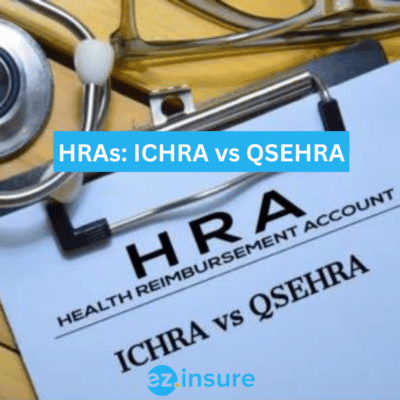Jump to:
What Is an ICHRA?
An Individual Coverage Health Reimbursement Arrangement, commonly referred to as an ICHRA, is a benefit funded by employers that reimburses employees for health insurance premiums and qualified medical expenses. Unlike traditional health plans, where employees are limited to one or a few pre-selected coverage options, ICHRAs let workers choose the plan of their choice, and then receive tax-free reimbursements for the plan’s cost.
While Qualified Small Employer Health Reimbursement Arrangements (QSEHRAs) exist only for businesses with less than 50 employees, ICHRAs can be offered to businesses of any size. All in all, ICHRAs serve as a great alternative to traditional group health insurance, as they provide more flexibility to employees, while helping employers manage costs efficiently.
How Does an ICHRA Work?
- Employers Decide on a Monthly Allowance: Business owners have the flexibility to decide how much or how little they wish to reimburse employees each month. This reimbursement amount can go towards the costs of employee premiums and other qualified medical expenses. It’s important to note that ICHRAs don’t have any IRS-imposed contribution limits, like QSEHRAs do.
- Employees Purchase Health Plans of Their Choosing: Employees have the ability to select just about any health plan they want. This includes plans through the Marketplace, private insurers, or Medicare (if applicable).
- Employees Submit Health Expenses: Employees provide proof of their premium cost as well as other eligible medical expenses as they come up. They will be submitted to either their employer directly or to a plan administrator.
- Employees are Reimbursed Tax-Free: After submitted expenses are approved, employers reimburse employees tax-free. Additionally, the reimbursements are tax-deductible for employers.
Who Qualifies for an ICHRA?
Employer Eligibility
Unlike QSEHRAs that operate only for businesses with less than 50 full-time equivalent employees, businesses of any size can offer an ICHRA. This includes large corporations, small businesses, non-profits, start-ups and more!
Employee Eligibility
In order to participate in an ICHRA, employees need to be enrolled in an individual health plan that provides minimum essential coverage (MEC). Additionally, they must provide their employer with proof of this insurance plan in order to receive the proper reimbursements.
Plan Structure
Additionally, employers can structure ICHRAs differently for different groups of employees. For example, full-time vs. part-time employees, or salaried vs. hourly employees could have varying setups and restrictions.
How Much Can Employers Contribute to an ICHRA?
While QSEHRAs have maximum employer contribution limits set each year by the IRS, ICHRAs have no limit. In other words, employers have total control of how little or how much they wish to reimburse employees. Additionally, separate reimbursement rates can be assigned to different classes of employees, as long as everyone within the same class is treated the same.
What Medical Expenses Can an ICHRA Cover?
In addition to providing reimbursement payments for employer premium costs, ICHRAs can also provide monetary relief for a number of qualified medical expenses. These expenses include:
- Prescription drugs
- Over-the-counter medications
- Preventative care
- Doctors visits/copay
- Hospital bills
- Routine dental care
- Routine eye care (exams, prescription lenses, and contacts)
- Certain medical supplies or at-home equipment
- Mental health services
- Physical therapy
- Chiropractic care
While the list of expenses that are eligible to be reimbursed by an ICHRA, they do not cover the following:
- Group health insurance plans sponsored by a spouses employer
- Medical expenses that aren’t IRS-qualified
What Are the Benefits of Offering an ICHRA?
- Employers and Employee Tax Advantages: Not only are reimbursements tax-free for employees, but they are also tax-deductible for business owners.
- Cost Flexibility for Employers: Employers have the freedom to contribute as little or as much in reimbursements as they want. Additionally, this amount can be adjusted on a yearly basis.
- Plan Flexibility for Employees: Employees have the flexibility to choose a plan that meets their specific needs and preferences, as opposed to being limited to an employer-selected plan.
- Administrative Ease: Unlike traditional group health plans that have varying rates that are negotiated every year and annual renewals, ICHRAs are straightforward with very little administrative work.
ICHRA vs. Traditional Group Health Insurance
| Characteristic | ICHRA | Traditional Group Health Plan |
| Business Size | Any Size (1+ employee) | Any Size (1+ employee) |
| Employer Contribution | The employer sets a monthly reimbursement amount of their choosing. | Employers pay a percentage of employee premiums each month. |
| Cost Predictability | Employers reimburse employee expenses up to a set amount. | Monthly premium payments are fixed, but can increase year over year. |
| Plan Choice for Employees | Employees select their own plan, depending on their needs. | Employees must enroll in a pre-selected plan that the employer chooses. |
| Compliance | Employee health plans must provide minimum essential coverage. | Plans must comply with ACA, COBRA and ERISA standards. |
How to Set Up an ICHRA for Your Business
- Determine Your Budget and Reimbursement Limits: Decide on the maximum amount of money you want to reimburse your employees each month. If you have multiple classes of employees (ex. full-time vs. part-time) be sure to highlight the differences in the set amounts.
- Create a Detailed Plan Document: Put together a document that includes reimbursement details, eligibility requirements and any other coverage details.
- Inform Your Employees: Using this document as a point of reference, inform your team about the ICHRA. Be sure to clearly explain how it functions and how they can enroll, as many people are not familiar with this health plan setup.
- Review and Adjust Each Year: Be sure to evaluate your ICHRA each year and make changes (if necessary), depending on budgeting preferences and employee feedback.
FAQs
What are the downsides of an ICHRA?
The main downside of ICHRAs is that there is a possibility that employer reimbursement amounts may not cover the entire cost of employee premiums or other medical expenses. In this particular scenario, employees could be faced with unexpected costs that must be paid out-of-pocket. This is especially possible for employees with a lot of healthcare needs.
What’s the difference between ICHRAs and HSAs?
Health Savings Accounts (HSAs) are tax-advantaged savings accounts that employees can use to pay for qualified medical expenses that fall under the health plan’s deductible. Additionally, HSAs are transferable, meaning employees can keep the funds even if they leave for another job. ICHRAs on the other hand, are non-transferable, and reimbursements can be used for premiums in addition to qualified medical expenses.
Can employees opt out of an ICHRA?
Yes— it’s entirely up to the employer whether or not they want to take advantage of the employer ICHRA. With that said, if they don’t opt in, they aren’t eligible to receive reimbursements for medical costs and premiums if they have their own health insurance plan.
Can employers offer both an ICHRA and a traditional group health plan?
In most cases, employers can only offer one or the other, since ICHRAs are contingent on employees purchasing their own non-employer sponsored health plan. The only time that an employer can offer both is if an ICHRA is offered to one class of employees, while another class of employees is covered by a traditional group health plan.
How does an ICHRA differ from a health stipend?
Health stipends are simply extra money allocated to each employee to be used for any medical costs. Additionally, health stipends are considered taxable income. On the other hand, ICHRAs offer tax-free reimbursements to employees and require proof insurance and claims, to ensure that funds are actually being used for qualified healthcare expenses.
Get Started with an ICHRA Today!
ICHRAs are a great choice for businesses of all sizes looking to provide flexibility to employees, without the complexity that often comes with traditional group health insurance. With so many health options available, you don’t need to settle for a plan that exceeds your budget or requires employees to obtain coverage that doesn’t fit their needs. Instead, consider an ICHRA!
Ready to get an ICHRA for your business? EZ.Insure makes the process quick and easy. Our platform offers access to free quotes, a plan comparison tool, and live assistance from expert insurance agents, so you’ll be sure to get a plan up and running in no time!
To get started, simply enter your ZIP code below, or call us directly at (844)-770-0064.







 HRAs work through a reimbursement system. Employers offer employees a monthly allowance of tax-free money that they can use to pay for healthcare services, including health insurance, and then the employer reimburses them up to their allowance amount. But what if you’re a sole proprietor? You can offer this arrangement to any employees you have, but can you participate in the savings from an HRA yourself? In short, generally no, but there is a way you might be able to!
HRAs work through a reimbursement system. Employers offer employees a monthly allowance of tax-free money that they can use to pay for healthcare services, including health insurance, and then the employer reimburses them up to their allowance amount. But what if you’re a sole proprietor? You can offer this arrangement to any employees you have, but can you participate in the savings from an HRA yourself? In short, generally no, but there is a way you might be able to!
